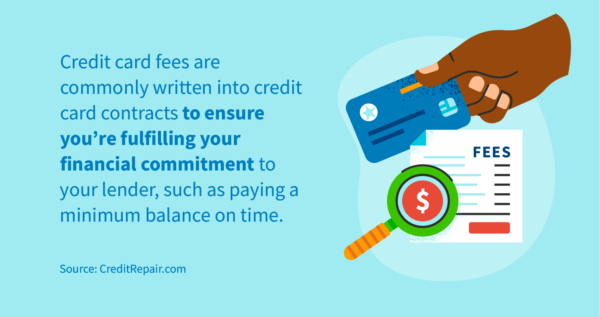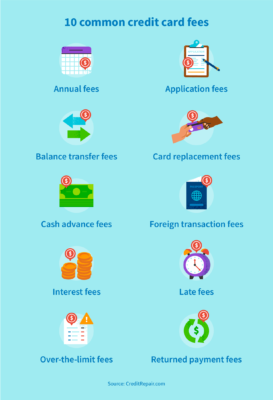
Disclosure regarding our editorial content standards.
You’ve done the research, investigated the perks, weighed the pros and cons and finally made a decision on what credit card is right for you. Once your application has been approved, you may be surprised by the number of credit card fees you’re now responsible for.
Credit cards come with more fees than are usually advertised during your research. Many of these credit card fees are written into your contract with your lender in order to make sure you’re fulfilling your commitment with them. Fees are also there to help you build credit because if you don’t pay your credit card bills on time, your credit score will likely be knocked down a few points.
Whether you’re new to the world of credit cards or are an experienced credit card user, understanding bank and credit card fees will help you become wiser about finances and help to improve your credit score. Below are 10 of the most common credit card fees, along with additional information on how to avoid them (if possible).
1. Application fees
How much: Varies across banks and lenders; less than 25 percent of your beginning limit
Prevalence: One-time fee
There may be an application fee charged when you sign up to open a new line of credit. This is a one-time fee that is charged at the beginning of your contract to make sure your application goes through, much like an application fee for an apartment.
Banks and creditors vary with how much they charge, but you don’t have to worry about this fee being too high. The Credit Card Accountability, Responsibility and Disclosure (CARD) Act of 2009 implemented a rule that these charges will be no higher than 25 percent of your beginning credit limit.
How to avoid: It’s not advised to skip out on an application fee for a credit card, as this may indicate you’re not a reliable borrower. If the application fee is too much, you may want to do some research to find a card with a lower application fee—or even none at all.
2. Annual fees
How much: Varies across banks and lenders
Prevalence: Once per year
When you sign up for a credit card, issuers will want to make sure you’re in this for the long run. You are an investment for the bank, so they’ll charge you an annual fee to make sure you stick with the commitment. An annual fee is in some ways like a deposit for your card, only you won’t be getting it back.
By paying this fee, you will be showing the bank you’re owning and using the card. This fee varies among providers, so look at the fine print of your contract.
How to avoid: Look for a card with no annual fee advertised, or ask your lender to waive the fee altogether.

3. Balance transfer fees
How much: Certain percentage of balance being transferred
Prevalence: One-time fee
If you’re looking to take your current balance to a new card that has lower rates, be prepared to be charged a balance transfer fee. Changing cards can be a viable option for someone looking to get their interest charges down, but generally, the balance transfer fee will be a certain percentage of the balance you’re switching. Talk with your credit card provider and see what the fee percentage is before you choose this option.
How to avoid: Stay with your current lender, or pay down your current credit card balance to lower your interest charge.
4. Card replacement fees
How much: Usually between $5 and $15
Prevalence: Once for every card replacement
Losing your wallet can be a headache, which can be made worse if your credit card company charges a fee to issue you a replacement card. It’s becoming increasingly common to issue physical card replacements for free, but be sure to read the fine print and see if you’d be responsible for this fee in the case of a lost card.
How to avoid: Find a credit card company that doesn’t charge for card replacements and be extra cautious with your wallet.
5. Cash advance fees
How much: Generally 3 to 5 percent of cash taken out
Prevalence: One-time fee
Although credit cards aren’t cash and shouldn’t be treated as such, you are able to get cash from your credit card in case of emergency, which is called a cash advance. If you find yourself in a true emergency, like your car breaking down when you don’t have a phone or wallet present, you can use a cash advance from your credit card.
This helps you out in a pinch, but it is something you should do as infrequently as possible due to the cash advance fee. Generally, the fee will be anywhere from 3 to 5 percent of the amount of cash you take out. In addition, you will also be charged interest on the amount of money you take out—which accrues immediately.
How to avoid: Try to carry regular cash around in case of emergency so you don’t need to get a cash advance.
6. Foreign transaction fees
How much: Usually anywhere from 1 to 3 percent of total transaction
Prevalence: Once for each foreign transaction
When planning out and budgeting for trips to foreign countries, be sure to factor in foreign transaction fees if you plan on using your credit card. These fees are charged to cover the additional processing done by your credit card company for foreign transactions.
This applies to online purchases made in foreign countries as well, so be cautious about online impulse purchases. Generally, these fees are anywhere from 1 to 3 percent of the total transaction.
How to avoid: Make foreign transactions infrequently, or find a card with no foreign transaction fees, such as travel credit cards.
7. Interest fees
How much: Varies depending on card APR
Prevalence: Once per month
Interest fees, also known as “finance charges,” are charged by lenders each month that you carry a balance on your credit card. The exact amount you’ll be charged is determined by your card’s annual percentage rate (APR) as well as the balance carried on your card.
How to avoid: Find a credit card with zero percent introductory APR (but note that this is temporary and you will be responsible for interest fees at some point), or pay your balance in full each month.
8. Late fees
How much: Usually a percentage of the missed minimum payment
Prevalence: One-time fee
At the end of each billing month, your interest fee will be charged and you must pay your credit card bill on a scheduled date. Generally, banks or credit providers will schedule this due date toward the beginning of the month, though you may be able to schedule it yourself for a time that works best for you.
If you fail to make the payment on its due date, you may be in trouble and will be charged a late fee. The exact fee varies among issuers, but be forewarned that it may be a good chunk of your minimum payment.
Along with the late fee, your credit score may also dip by a few points. Making payments on time and avoiding late fees is important because on-time payments account for 35 percent of your credit score. By making credit card payments on time, you will be able to avoid late fees and improve your credit score.
How to avoid: Pay your credit card bill on time or set up autopay so you never miss a payment.

9. Over-the-limit fees
How much: Varies across banks and lenders
Prevalence: Whenever you go over your credit card limit
An over-the-limit fee is charged when a transaction goes over your current credit card limit. However, credit card lenders are required to get your consent before they authorize purchases that go over your current limit, and will ask you to opt in or authorize the purchase. This allows you to avoid going over your limit and being charged an over-the-limit fee.
If needed, you could also ask your borrower for an increased credit limit—though it’s best to not make a habit of this.
How to avoid: Don’t opt in to over-limit transactions, and use a different payment method for those purchases.
10. Returned payment fees
How much: Varies across banks and lenders
Prevalence: Once for every returned payment
Returned payments cost you more than just the temporary embarrassment of having insufficient funds—they can come with a fee. Credit card companies charge this fee when your payment account either cannot process a transaction, has a negative balance or has insufficient funds.
How to avoid: Know how much is in your checking account before making a credit card payment, or deposit funds into the account beforehand.
Credit card fees will vary across lenders, situations and exact amounts charged, but what doesn’t change is that you should know what fees you’re responsible for. Familiarizing yourself with credit card fees and jargon will help make you a more educated borrower, which will hopefully translate into benefiting your overall credit score.
Note: The information provided on CreditRepair.com does not, and is not intended to, act as legal, financial or credit advice; instead, it is for general informational purposes only.
Questions about credit repair?
Chat with an expert: 1-800-255-0263






